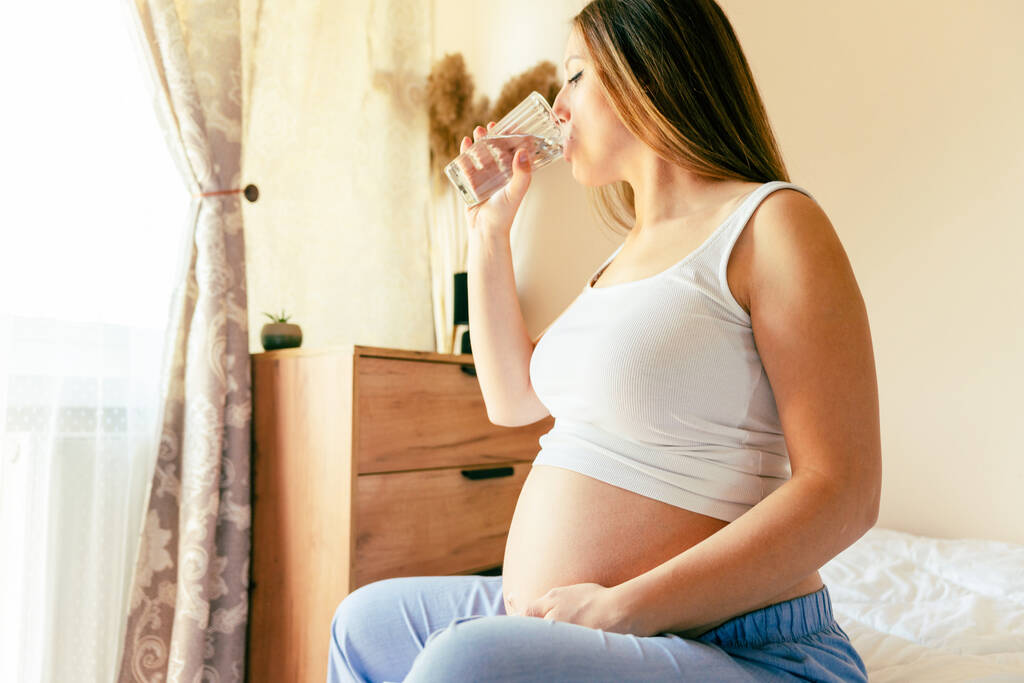Discover the potential link between dehydration and back pain during early pregnancy.
Can Dehydration Cause Back Pain in Early Pregnancy?
Pregnancy is an incredible journey filled with joy, excitement, and sometimes, a few unexpected surprises. One of these surprises can be the occurrence of back pain. But did you know that dehydration could be the culprit behind those nagging aches? It may sound surprising, but it’s true! In this article, we’ll dive into the fascinating connection between dehydration and back pain during early pregnancy. So grab a refreshing glass of water, sit back, and let’s explore this important topic together.

Understanding Dehydration: Causes and Symptoms
Before we can understand how dehydration relates to back pain in early pregnancy, let’s make sure we’re on the same page when it comes to dehydration. Dehydration occurs when our bodies lose more fluids than we consume. There are several common causes of dehydration, including inadequate fluid intake, excessive sweating, vomiting, and diarrhea.
So how can you tell if you’re dehydrated? Look out for symptoms such as increased thirst, dry mouth, dark urine, fatigue, dizziness, and, you guessed it, back pain. Whether you’re pregnant or not, staying hydrated is key to maintaining your overall health and well-being.
The Role of Hydration in the Body
Hydration plays a crucial role in our bodies. It helps regulate our body temperature, lubricates our joints, aids digestion, and supports the transportation of nutrients throughout our bodies. During pregnancy, proper hydration becomes even more important as your body adjusts to the amazing changes happening within.
When you’re pregnant, your blood volume increases, your baby grows, and your kidneys work overtime. All these factors require additional fluids to keep everything functioning smoothly. So make sure you’re sipping on water throughout the day to keep dehydration at bay.
In addition to the physiological benefits, staying hydrated during pregnancy can also help alleviate common discomforts such as constipation, hemorrhoids, and swelling. Water acts as a natural lubricant for your digestive system, making it easier for food to pass through and reducing the chances of constipation. It also helps flush out toxins from your body, which can contribute to reducing swelling and preventing the formation of painful hemorrhoids.
Identifying Signs of Dehydration
Now that we understand the importance of staying hydrated, let’s talk about how to identify the signs of dehydration. Remember, prevention is always better than cure! If you experience any of the following symptoms, it might be a sign that you need to reach for a water bottle:
- Increased thirst
- Dry mouth and lips
- Infrequent urination and dark-colored urine
- Headaches and dizziness
- Fatigue and weakness
These symptoms can arise in any trimester of pregnancy, so it’s essential to listen to your body and give it the hydration it needs.
Furthermore, it’s important to note that dehydration can have more severe consequences during pregnancy. It can lead to complications such as preterm labor, low amniotic fluid levels, and even neural tube defects in the developing baby. By staying hydrated, you are not only taking care of yourself but also ensuring the well-being of your unborn child.
In conclusion, understanding the causes and symptoms of dehydration is crucial for maintaining a healthy pregnancy. By staying hydrated and recognizing the signs of dehydration, you can prevent discomforts, complications, and promote the overall well-being of both you and your baby.
The Connection Between Dehydration and Back Pain
Now that we have a solid foundation of understanding about dehydration, let’s delve into how it relates to back pain during pregnancy. You might be wondering, “How can something as simple as hydration affect my back?” Well, let’s find out!
During pregnancy, the body goes through numerous changes, both internally and externally. These changes can have a significant impact on the musculoskeletal system, including the back. One of the key factors that can contribute to back pain during pregnancy is dehydration.
How Dehydration Affects Muscles and Joints
Dehydration can have a profound impact on our muscles and joints. When our bodies lack sufficient fluids, the muscles and joints can become stiff, tense, and prone to inflammation. This can lead to discomfort and pain, particularly in areas like the lower back.
When a pregnant woman is dehydrated, the muscles and joints in the back are more susceptible to strain and stress. The lack of hydration can cause the muscles to become tight and less flexible, making it difficult for them to support the growing weight of the baby. Additionally, dehydration can lead to increased inflammation in the joints, exacerbating any existing discomfort.
It is important to note that dehydration can affect anyone, not just pregnant women. However, the changes that occur in the body during pregnancy can make the effects of dehydration more pronounced.
Dehydration and Spinal Health
Our spines are the backbone (pun intended!) of our bodies, quite literally. They provide support, protection, and flexibility. However, when dehydration enters the picture, our spinal health can be compromised.
Dehydration can affect the discs in our spine, which act as cushions between the vertebrae. These discs rely on water to maintain their plumpness and ability to absorb shock. When dehydrated, the discs may become compressed, leading to spinal discomfort and, you guessed it, back pain.
During pregnancy, the hormonal changes in the body can also affect the discs in the spine. The increased levels of relaxin, a hormone that helps prepare the body for childbirth, can cause the ligaments and discs to become more relaxed. When combined with dehydration, this can further contribute to back pain as the spine becomes less stable.
It is crucial for pregnant women to stay hydrated to support their overall health and minimize the risk of back pain. Drinking an adequate amount of water throughout the day can help keep the muscles and joints in the back supple and reduce the likelihood of discomfort.
In conclusion, dehydration can have a significant impact on back pain during pregnancy. It can affect the muscles and joints, making them more prone to stiffness and inflammation. Additionally, dehydration can compromise spinal health by compressing the discs and destabilizing the spine. By staying hydrated, pregnant women can mitigate these effects and promote a healthier, more comfortable pregnancy.
Pregnancy and Increased Risk of Dehydration
Now that we understand how dehydration can impact our back, let’s explore why pregnant women are more susceptible to dehydration in the first place.
Changes in the Body During Pregnancy
Pregnancy is a time of incredible changes within the body. As your baby grows, so does the demand for nutrients and fluids. Additionally, hormonal changes can increase your need for water. These factors combined make it crucial for pregnant women to pay close attention to their hydration levels.
During pregnancy, the body undergoes various physiological changes to support the growing fetus. The blood volume increases by about 50%, and the heart works harder to pump blood to the developing baby. This increased blood volume requires an adequate intake of fluids to maintain proper circulation and ensure optimal oxygen and nutrient delivery to both the mother and the baby.
Furthermore, the amniotic fluid surrounding the baby acts as a cushion and helps with the development of the baby’s lungs, digestive system, and musculoskeletal system. This fluid is mainly composed of water, and its production and maintenance rely on the mother’s hydration status. Insufficient fluid intake can lead to reduced amniotic fluid levels, potentially affecting the baby’s growth and development.
Why Pregnant Women are More Prone to Dehydration
There are several reasons why pregnant women are more prone to dehydration. Firstly, morning sickness can lead to vomiting and increased fluid loss. The frequent episodes of vomiting can quickly deplete the body’s water stores, leading to dehydration if not properly replenished.
Secondly, the hormone progesterone, which rises during pregnancy, can cause more frequent urination, increasing the risk of dehydration. Progesterone relaxes the smooth muscles of the urinary tract, allowing the bladder to expand and accommodate the growing baby. While this is essential for the baby’s development, it also means that pregnant women may need to urinate more frequently, especially as the pregnancy progresses. This increased urination can result in a higher fluid output, necessitating a higher fluid intake to maintain proper hydration.
Lastly, as your baby grows, they put pressure on your bladder, leading to increased trips to the bathroom. The growing uterus can compress the bladder, reducing its capacity and causing pregnant women to feel the need to urinate more frequently. This additional strain on the bladder can further contribute to the risk of dehydration if fluid intake is not adequately increased.
So, it’s no surprise that pregnant women need to prioritize their hydration to prevent the development of back pain and ensure a healthy pregnancy. Adequate fluid intake, in the form of water, herbal teas, and hydrating foods, is crucial for maintaining the body’s functions, supporting the baby’s growth, and minimizing the risk of dehydration-related complications.
Dehydration-Induced Back Pain in Early Pregnancy
Now that we’ve established the connection between dehydration and back pain during pregnancy, let’s explore how dehydration can specifically contribute to back pain in the early stages of pregnancy.
How Dehydration Contributes to Back Pain in Pregnancy
During early pregnancy, dehydration can exacerbate the already changing dynamics within your body. With the hormonal fluctuations and increased need for fluids, inadequate hydration can further amplify back pain.
Dehydration can also affect the uterine muscles, making them more prone to cramping. These uterine cramps can radiate to the lower back, causing discomfort and pain.
Differentiating Normal Pregnancy Back Pain from Dehydration-Induced Pain
It’s important to note that not all back pain during pregnancy is necessarily caused by dehydration. Normal pregnancy back pain, known as “pregnancy-related low back pain,” can occur due to ligament stretching, changes in posture, and the shifting center of gravity. However, when dehydration is thrown into the mix, the pain can become more intense and persistent.
Preventing Dehydration and Back Pain in Pregnancy
Now that we understand the relationship between dehydration and back pain in early pregnancy, let’s focus on some practical steps you can take to prevent both.

Hydration Tips for Pregnant Women
Here are some hydration tips specially tailored for the expectant mamas out there:
- Carry a water bottle with you wherever you go to ensure easy access to hydration.
- Set reminders or create a hydration schedule to ensure you’re drinking enough throughout the day.
- Opt for hydrating foods like fruits and vegetables to supplement your fluid intake.
- Limit your caffeine and sugary beverage intake, as they can contribute to dehydration.
- Listen to your body and drink when you feel thirsty; it’s your body’s way of telling you it needs more fluids.
Safe Pain Management Strategies for Pregnant Women
If you’re already experiencing back pain during early pregnancy, there are safe pain management strategies you can try:
- Apply a warm or cold compress to the affected area for soothing relief.
- Practice gentle exercises approved by your healthcare provider, such as prenatal yoga or water aerobics.
- Consider engaging in relaxation techniques like meditation or deep breathing to ease muscle tension.
- Consult with your healthcare provider about safe and appropriate pain relief options if needed.
Remember, always talk to your healthcare provider before making any significant changes to your routine, especially during pregnancy.
In Conclusion
In conclusion, dehydration can indeed contribute to back pain during early pregnancy. Staying properly hydrated is essential for overall health, and during pregnancy, it becomes even more important. By understanding the causes, symptoms, and prevention strategies for dehydration, you can help alleviate back pain and ensure a healthier, more comfortable pregnancy. So take care of yourself, stay hydrated, and enjoy this extraordinary journey into motherhood!



